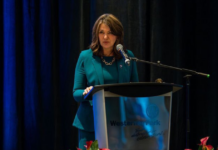The Public Health Emergencies Governance Review Panel, led by former Reform Party leader Preston Manning, has released comprehensive recommendations to refine Alberta’s future public health emergencies response.
The final report contained over 90 recommendations and was delivered to the Government of Alberta on Tuesday.
Alberta Premier Danielle Smith tasked the panel of six members to undertake a detailed review of the legislation and governance employed during the Covid-19 pandemic. The panel was to recommend changes and additional legislation to prepare the province better for future public emergencies.
The panelists include Michel Kelly-Gagnon, The Honourable John. C. Major, Preston Manning, Dr. Jack Mintz, Dr. Martha Fulford, and Dr. Robert Tanguay.
The panel was not meant to conduct an overall inquiry into the government’s pandemic response but rather to review the legal basis behind the emergency actions.
The panel focused on statutes that authorized orders in council, ministerial orders, and broader regulations.
Legislation reviewed included the Administrative Procedures and Jurisdiction Act, Alberta Bill of Rights, Alberta Human Rights Act, COVID-19 Related Measures Act, Education Act, Emergency Management Act, Employment Standards Code, Health Professions Act, Judicature Act, Public Health Act, and Regional Health Authorities Act.
The six-member panel balanced a number of factors including mental health and wellness, child and student health, professional standards, among others.
In a recent interview on The Andrew Lawton Show, Manning emphasized the need to balance emergency measures and civil liberties. He explained that the mandate was to investigate the legislation that authorized the government’s response to Covid-19 and suggest amendments for the next emergency.
Manning stressed the necessity for clearer definitions in Alberta’s emergency legislation, acknowledging that existing laws did not anticipate widespread crises like COVID-19. He explained that the current legislation and Education Act never envisioned the government having to think about shutting down the system.
Manning expressed concerns about school closures, stating, “The damage that you do by closing down the school system in comparison to the benefit you get, it’s just simply not worth doing.”
Regarding vaccine passports, Manning indicated that stronger rights protections would pose challenges to their implementation, saying, “If you strengthen those rights provisions of the bill, you’d make it a lot more difficult to implement those types of measures.” He also noted that strengthening the Bill of Rights would cause a need for greater justification before the courts for such measures.
The panel advocated for mandatory impact assessments for emergency measures, a practice Manning believed was insufficient during the pandemic. While focused on Alberta, Manning mentioned that the recommendations might have broader relevance for provinces with similar legislation. He recognized the potential applicability of the recommendations beyond Alberta, despite the panel’s provincial mandate.
The Public Health Emergencies Governance Review Panel’s report calls for significant legislative amendments in Alberta, particularly strengthening civil liberties and redefining emergency responses. The report underscores the need to strengthen the Alberta Emergency Management Agency (AEMA) to lead provincewide emergency coordination and appoint a Senior Science Officer to develop a robust scientific advisory system.
The report calls for transparency and evidence-based decision-making within the Alberta regulatory framework. It advises against provincewide school closures except in extraordinary circumstances. The panel emphasizes the importance of conducting thorough impact assessments for emergency measures to ensure their effectiveness while minimizing infringements on civil liberties. Proposed amendments to the Alberta Bill of Rights aim to fortify rights and freedoms during emergencies.
Additionally, the report advocates for increased protections for workers’ and healthcare professionals’ rights during emergencies. It recommends enhancing the healthcare system’s capacity to handle surges in demand and suggests hosting a colloquium with global healthcare leaders to learn from best practices.
The report underscores the need for a balanced approach to managing public health crises, emphasizing education and the careful assessment of emergency measures. The Alberta government now faces the task of implementing these crucial recommendations.





















